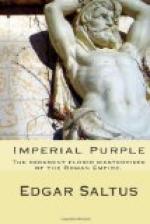The role was very real to him. After the fashion of Olympians he became frankly incestuous, seducing vestals, his sisters too, and gaining in boldness with each metamorphosis, he menaced the Capitoline Jove. “Prove your power,” he cried to him, “or fear my own!” He thundered at him with machine-made thunder, with lightning that flashed from a pan. “Kill me,” he shouted, “or I will kill you!” Jove, unmoved, must have moved his assailant, for presently Caligula lowered his voice, whispered in the old god’s ear, questioned him, meditated on his answer, grew perplexed, violent again, and threatened to send him home.
These interviews humanized him. He forgot the moon and mingled with men, inviting them to die. The invitation being invariably accepted, he became a connoisseur in death, an artist in blood, a ruler to whom cruelty was not merely an aid to government but an individual pleasure, and therewith such a perfect lover, such a charming host!
“Dear heart,” he murmured to his mistress Pryallis, as she lay one night in his arms, “I think I will have you tortured that you may tell me why I love you so.” But of that the girl saw no need. She either knew the reason or invented one, for presently he added: “And to think that I have but a sign to make and that beautiful head of yours is off!” Musings of this description were so humorous that one evening he explained to guests whom he had startled with his laughter, that it was amusing to reflect how easily he could have all of them killed.
But even to a god life is not an unmixed delight. Caligula had his troubles. About him there had settled a disturbing quiet. Rome was hushed, the world was very still. There was not so much as an earthquake. The reign of Augustus had been marked by the defeat of Varus. Under Tiberius a falling amphitheatre had killed a multitude. Caligula felt that through sheer felicity his own reign might be forgot. A famine, a pest, an absolute defeat, a terrific conflagration—any prodigious calamity that should sweep millions away and stamp his own memory immutably on the chronicles of time, how desirable it were! But there was nothing. The crops had never been more abundant; apart from the arenas and the prisons, the health of the empire was excellent; on the frontiers not so much as the rumor of an insurrection could be heard, and Nero was yet to come.
Perplexed, Caligula reflected, and presently from Baiae to Puzzoli, over the waters of the bay, he galloped on horseback, the cuirass of Alexander glittering on his breast. The intervening miles had been spanned by a bridge of ships and on them a road had been built, one of those roads for which the Romans were famous, a road like the Appian Way, in earth and stone, bordered by inns, by pink arcades, green retreats, forest reaches, the murmur of trickling streams. So many ships were anchored there that through the unrepleted granaries the fear of famine stalked. Caligula, meanwhile, his guests behind him, made cavalry charges across the sea, or in a circus-chariot held the ribbons, while four white horses, maddened by swaying lights, bore him to the other shore. At night the entire coast was illuminated; the bridge was one great festival, brilliant but brief. Caligula had wearied of it all. At a signal the multitude of guests he had assembled there were tossed into the sea.




